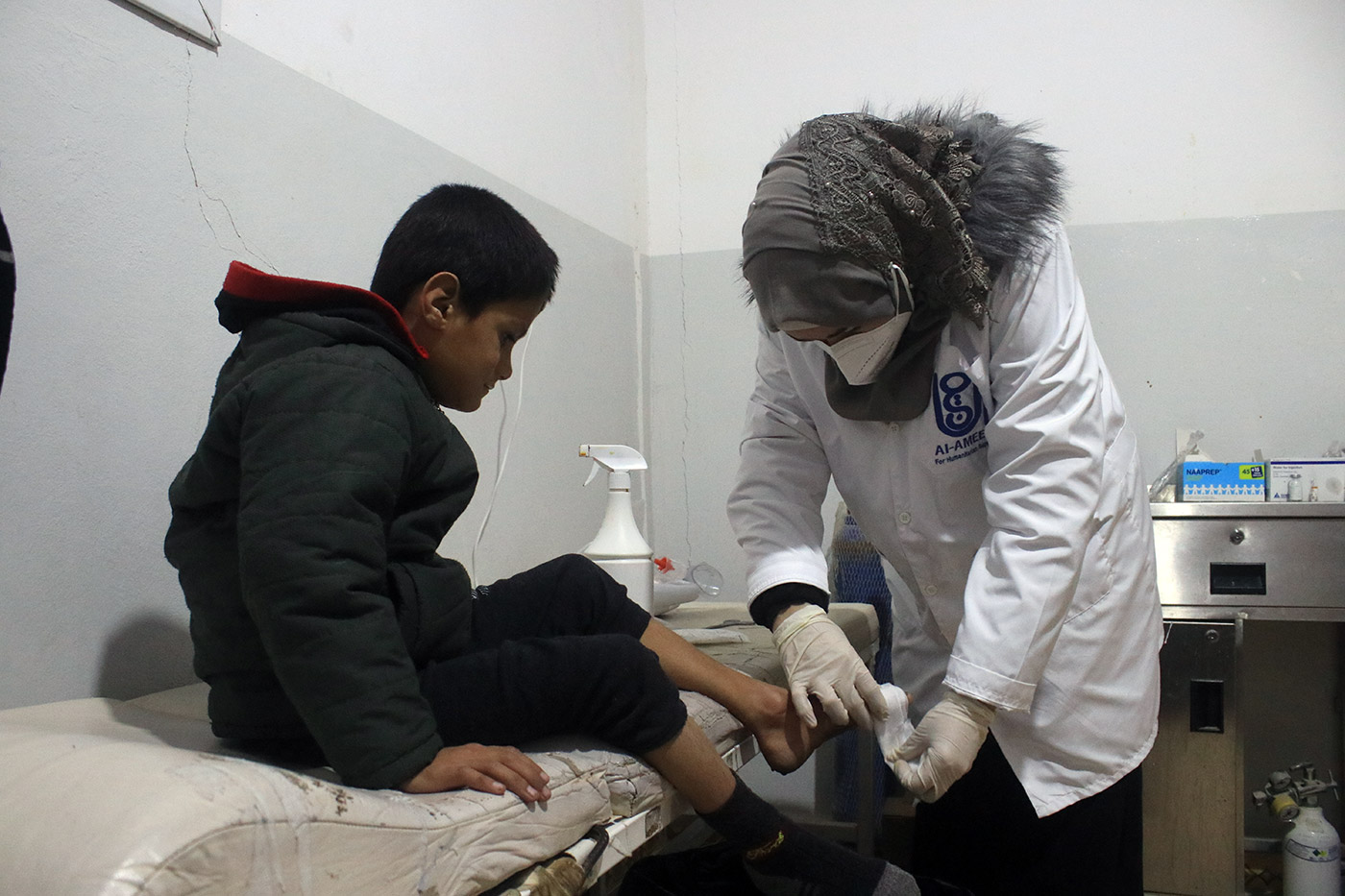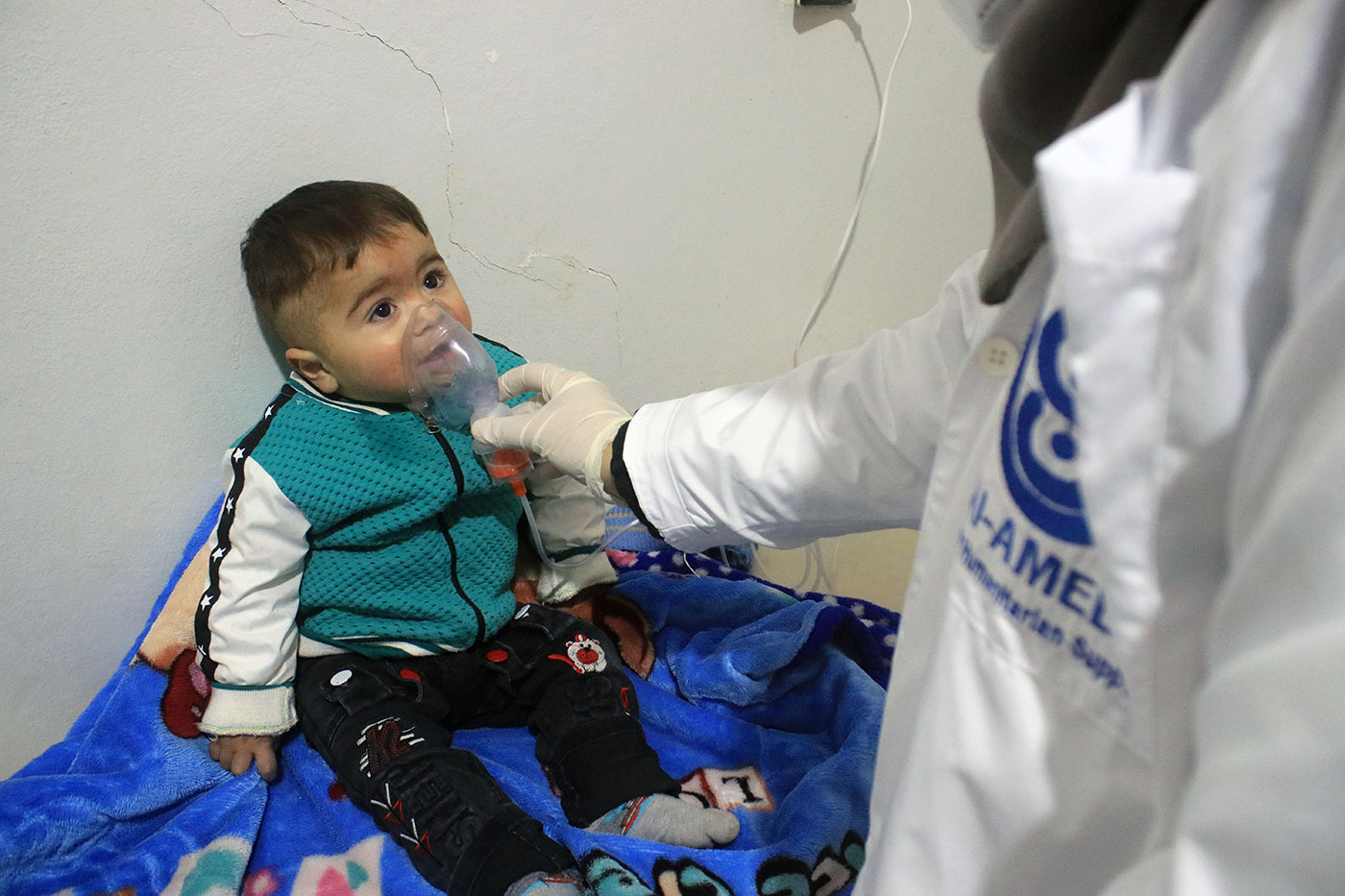 Nurse Fawziya carefully changes a child’s dressing, ensuring proper wound care and recovery. Photo: WHO27 February 2025, Aleppo Syrian Arab Republic – For Fawziya Ismail Al-Hasan, nursing is more than a profession; it is a commitment to serving those who need care the most. Displaced from rural Homs, she has lived with her husband and three children in Qara Kobri camp in Aleppo for over six years. For the past five years, she has worked at the Qara Kobri primary health care center, a facility managed by Al-Ameen, where she joined as a nurse in 2021.
Nurse Fawziya carefully changes a child’s dressing, ensuring proper wound care and recovery. Photo: WHO27 February 2025, Aleppo Syrian Arab Republic – For Fawziya Ismail Al-Hasan, nursing is more than a profession; it is a commitment to serving those who need care the most. Displaced from rural Homs, she has lived with her husband and three children in Qara Kobri camp in Aleppo for over six years. For the past five years, she has worked at the Qara Kobri primary health care center, a facility managed by Al-Ameen, where she joined as a nurse in 2021.
“I provide nursing care for both displaced people and residents in the village and nearby communities,” she explains.
“Since there are no other health centres around, we offer vital services like dressing wounds, disinfecting and stitching injuries, administering IV and intramuscular injections and other essential nursing support.”
A health system under strain
Fawziya’s work is a lifeline for many in the camp and surrounding areas, where health care remains difficult to access. In 2025, 15.8 million people – more than 65% of the total population – will need humanitarian health assistance. Among them are 7.4 million internally displaced persons (IDPs), 22% of whom live in Aleppo. Many, like Fawziya’s neighbours, live in tents with little protection from extreme weather, limited access to clean water and poor sanitation.
With no nearby hospitals, the Qara Kobri primary health care centre is often the only option for people in need. Located in Al-Bab in northern Syria, the centre provides free health care services, from prevention and awareness to treatment. Thousands of patients visit each month for consultations, medications from its pharmacy, and referrals for critical cases in partnership with other health providers.
“We know how important this centre is for people living under tough conditions, far from larger hospitals,” Fawziya says. “Sometimes, we are the only hope for people who cannot afford to travel long distances for basic medical care.”
Saving lives against the odds
 With a rise in influenza cases during winter months, Nurse Fawziya provides oxygen support to a young patient struggling to breathe. Photo: WHOSyria’s health system is in crisis. Across the country, only 57% of hospitals and 37% of primary health care centres are fully functional, with widespread shortages of medicines and equipment. More than 100 health facilities in the northwest lack funding to ensure continuity of services. Those that remain operational struggle with insufficient medical supplies, trained personnel and resources.
With a rise in influenza cases during winter months, Nurse Fawziya provides oxygen support to a young patient struggling to breathe. Photo: WHOSyria’s health system is in crisis. Across the country, only 57% of hospitals and 37% of primary health care centres are fully functional, with widespread shortages of medicines and equipment. More than 100 health facilities in the northwest lack funding to ensure continuity of services. Those that remain operational struggle with insufficient medical supplies, trained personnel and resources.
Despite the challenges, Fawziya is determined. She recalls a young boy suffering from severe dehydration. Without the centre’s quick intervention his condition could have been fatal.
“We face tough situations but standing by our patients, offering not just medical care but emotional support, is what matters most,” she says.
Keeping health care running
WHO, supported by KSrelief, is providing vital assistance across Syria to keep critical health services operational. Over the past 4 months funding from KSrelief has helped sustain more than 50 health facilities in northwest Syria, including hospitals, primary health care centres, dialysis units and tuberculosis treatment centres. Since November 2024, over 154 000 people have benefitted from medical consultations, treatments and surgery.
As well as keeping facilities open, KSrelief support strengthens the referral system and provides essential medicines and medical equipment to ensure patients receive the care they need.
Care and resilience
Despite the hardships, Fawziya finds strength in the team she works with.
“My colleagues are like a second family. We work together with love and dedication, driven by the need to ease people’s suffering.”
She is grateful for the support that keeps the facility running. “Thanks to KSrelief funding our health facility can cover staff salaries, which is vital. Without this support many of us would have to work as volunteers because resources are so limited. KSrelief’s help ensures we can continue to serve our community consistently and with the care they deserve.”
Through partnerships like WHO and KSrelief, facilities such as Qara Kobri primary health care centre remain open, offering a vital lifeline to people in need, today and in the years to come.




